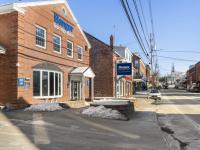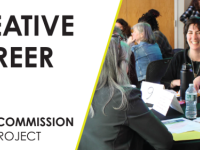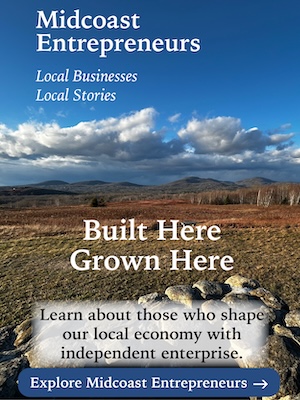After whatever fleeting glory, a home
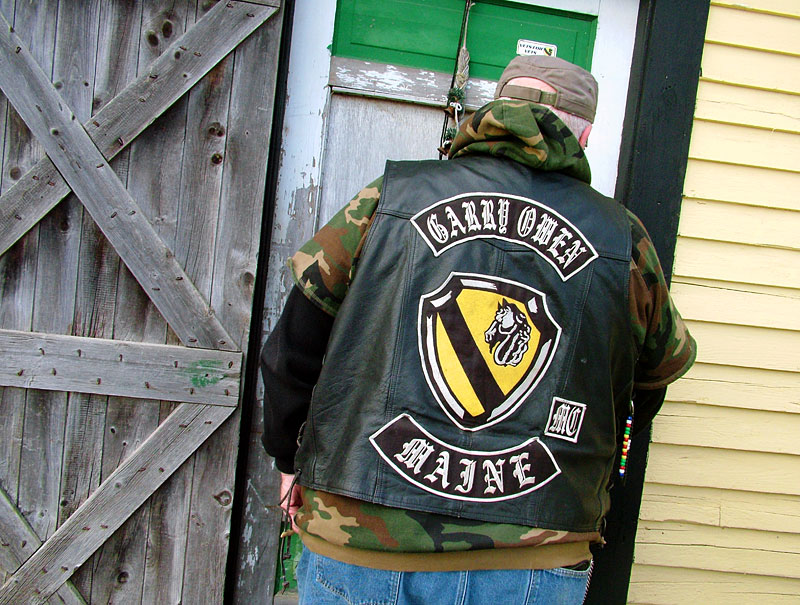 Dwayne Keller of the Garry Owen Motorcycle Club opens the front door of the old Montville farmhouse he and other club members are renovating as a shelter and advocacy center for veterans. (Photo by Ethan Andrews)
Dwayne Keller of the Garry Owen Motorcycle Club opens the front door of the old Montville farmhouse he and other club members are renovating as a shelter and advocacy center for veterans. (Photo by Ethan Andrews)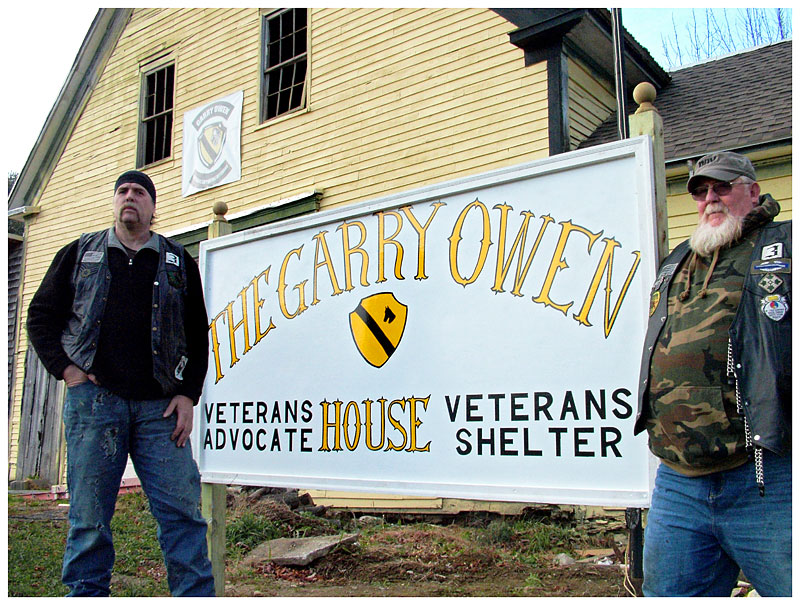 George Biagiotti, left, and Dwayne Keller, members of the Garry Owen Motorcycle Club, outside the new Garry Owen House. (Photo by Ethan Andrews)
George Biagiotti, left, and Dwayne Keller, members of the Garry Owen Motorcycle Club, outside the new Garry Owen House. (Photo by Ethan Andrews) The old Montville farmhouse donated to the Garry Owen Motorcycle Club, currently under renovation as a veteran's shelter, seen from Route 3. (Photo by Ethan Andrews)
The old Montville farmhouse donated to the Garry Owen Motorcycle Club, currently under renovation as a veteran's shelter, seen from Route 3. (Photo by Ethan Andrews) Dwayne Keller of the Garry Owen Motorcycle Club opens the front door of the old Montville farmhouse he and other club members are renovating as a shelter and advocacy center for veterans. (Photo by Ethan Andrews)
Dwayne Keller of the Garry Owen Motorcycle Club opens the front door of the old Montville farmhouse he and other club members are renovating as a shelter and advocacy center for veterans. (Photo by Ethan Andrews) George Biagiotti, left, and Dwayne Keller, members of the Garry Owen Motorcycle Club, outside the new Garry Owen House. (Photo by Ethan Andrews)
George Biagiotti, left, and Dwayne Keller, members of the Garry Owen Motorcycle Club, outside the new Garry Owen House. (Photo by Ethan Andrews) The old Montville farmhouse donated to the Garry Owen Motorcycle Club, currently under renovation as a veteran's shelter, seen from Route 3. (Photo by Ethan Andrews)
The old Montville farmhouse donated to the Garry Owen Motorcycle Club, currently under renovation as a veteran's shelter, seen from Route 3. (Photo by Ethan Andrews)MONTVILLE - Dwayne Keller of the Garry Owen Motorcycle Club looks every bit the part of a classic outlaw biker — his big frame draped in a black leather vest covered in patches covering a camouflage shirt, the sunglasses and long beard. The same could be said of fellow member George Biagiotti, who sports a handlebar moustache and tight black do-rag.
But outlaw is not how these guys roll. Not any more at least.
Keller and Biagiotti are both military veterans — Keller served in the Army in Vietnam and Biagiotti did mobile communications for the Air Force in the years leading up to the first Gulf War.
Along with an unspecified number of other members (more on that later), they share a love of motorcycles and the trappings of biker culture. But their primary goal — what separates them from what Keller calls the "lifestyle" clubs — is a desire to help fellow veterans who have fallen through the cracks.
Keller used to be one of those. When he got his discharge from the Army after serving in Vietnam, he ran as far from the government as he could. Only after a brush with skin cancer in 2010 did he find his way to the Togus office of the Department of Veterans Affairs, and even then it took some cajoling.
"I wish somebody had told me earlier," he said. "A lot of vets don't know what to do or who to talk to. We've got a lot of people [in the motorcycle club] who know the system and have been through it."
The club formed around a year-and-a-half ago. This past April, Keller and company were given an old farmhouse on Route 3 and set to work turning it into The Garry Owen House — a shelter for homeless veterans and veterans' advocacy center. By November, they had put on a new roof, painted the clapboard exterior, removed large amounts of miscellaneous junk from the property and gutted the interior of the home down to the wood frame and lathe.
On a seasonably chilly day recently, Keller and Biagiotti dropped by the house to talk about the club. Inside, a newly installed wood stove was surrounded by a few cast-off chairs the group had set up for informal meetings. Eventually, they hope to have their clubhouse here and be able to board eight veterans. But for all the work they've done the house could still have passed for a squat.
Keller, who was once homeless for a time, sat down in an armchair.
"I've lived in a lot worse," he said.
Across the street a homeless veteran was living in his car, according to Biagiotti, who said they'd offered the man their work-in-progress as a shelter, but for personal reasons he didn't want to come in.
A local business owner has been helping the club file for nonprofit status, and the bikers have already established a connection with a food pantry that has offered to help. They've received donations of lumber, paint and labor, and are hoping for additional support in in the coming months in the form of new members, outside donations and possibly grants.
"Everything we do is just for the vets," Keller said. "We're about family, then jobs," he said, trailing off in a way that suggested priorities three, four and five could easily be something other than motorcycles or the cultish loyalty that Keller said top the list of outlaw clubs like the Exiles, the Saracens and a handful of others that have chapters in Maine.
It was members from one of these clubs who confronted Keller recently about the Garry Owen MC logo, and an apparent turf infringement implied by the design.
"There's a couple outlaw clubs that don't like us working the 'Maine' bottom rocker," he said. "I was accosted in Manchester. They thought they were going to take my cut."
To back up a minute for the non-bikers: The bottom rocker is the lower panel of a three-part patch displayed on the back of a club member's traditional thin black leather vest, known as a "cut." The patch on the back of Keller's cut has the word "Maine" in a heavy Gothic font on the bottom rocker, the center panel is a stylized version of the U.S. Army's 1st Cavalry patch, and the top rocker reads "Garry Owen."
The club name comes from the Irish song "Garryowen" — after a neighborhood, or maybe a castle, in Limerick, Ireland — that was put to common use as a regimental march by British and American military forces over the last two centuries. Gen. George Custer famously adopted the tune for his 7th Cavalry Regiment, inspiring a set of American lyrics telling of heriocs at the Battle of the Little Bighorn.
The original Irish version was more of a drunken carpe diem anthem, but both versions convey a sense of fleeting glory.
Soldiers returning from World War II would have known the feeling, if not the song. And it was arguably in the spirit of the Irish version that the archetype of the American outlaw biker was born.
In the summer of 1947, Hollister, Calif., was briefly host to scores of newly-minted World War II veterans who came to the town for a three-day "Gypsy Tour Motorcycle Rally."
The ex-soldiers drank a lot, drove their bikes into the bars and it was all funny until it wasn't anymore. Though the term "riot" is probably a misnomer, the press seized on the mayhem, prompting the American Motorcyclist Association to issue a statement vouching for the 99-percent of motorcyclists they said were law abiding citizens.
The AMA later claimed no record of having made the statement, but it was too late — the idea of a tiny outlaw minority too appealing. The image of Marlon Brando in The Wild One, which was based on Hollister, only added fuel to the fire and scores of clubs took up the banner of the "1%," with many living up to the outlaw reputation — operating more like gangs and engaging in organized crime and violence.
The guys in the Garry Owen MC aren't one-percenters, but they share a style with the outlaw clubs and every other biker club tracing its roots to that post-war period. Like the one-percenters, most Garry Owen members ride chopper style bikes, though Biagiotti said they get the occasional "crotch rocket," too.
And of course they wear the traditional leather cut emblazoned with the club's three-part patch, which as Keller recalls was chosen because it looked good, and not as a territorial grab. But they're not changing it either.
"I've been through too much to back down to some punk like that," he said, referring to the incident in Manchester. "I'm not wired that way."
Asked if they've had any more trouble since then, Keller said not really, but there have been veiled threats, which is the reason he's not saying how many members are in the club.
"It's high school stuff, but they're serious," he said.
(For what it's worth, the U.S. Bureau of Alcohol, Tobacco, Firearms and Explosives, which gives its generic designation "outlaw motorcycle gang" the shorthand "OMG," is serious too.)
A more subtle threat from the outlaw clubs manifested recently when a younger member of the Garry Owen MC "prospected" for membership in a one-percent club, but it didn't last and he came back. When he did, he had to prospect again for Garry Owen.
Keller had a laugh about that one. Then he was quiet for a moment.
"If I was 30 years old, I might prospect," he said. "But when you're 60 years old you're not going to go prospect for the Hell's Angels."
Biagiotti, who looks younger than Keller but not enough to be mistaken for a 30-year-old, didn't protest on either point.
Penobscot Bay Pilot reporter Ethan Andrews can be reached at ethanandrews@penbaypilot.com .
Event Date
Address
Route 3
Montville, ME 04941
United States


















